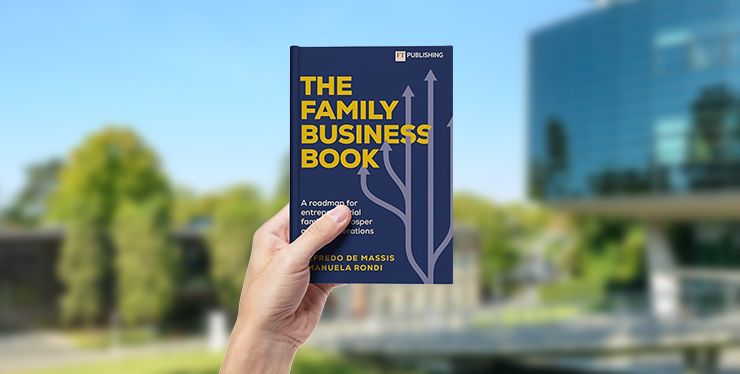
Bringing the family back into the business
Surprisingly, most family businesses do not see the value in communicating about their history, their values and their long-term vision as owners of a company. Of course, it is easier not to put the family’s reputation on the line. But that also means missing out on the advantages that come with it.
In today’s increasing uncertain business environment, more and more corporations have become faceless entities with few authentic role models, inadequate societal and ethical benchmarks, and shorter CEO tenures. Family businesses are in a unique position to differentiate themselves by building their own brands. When owners publicly declare their commitment to support a family business in the long run, the brand gains the credibility and trust that is necessary to build loyalty among both internal and external stakeholders.
Getting the family involved – the powerful double benefit
Owners looking to avoid the mistake of staying in the background often have questions about how to do it effectively. To find answers to these questions we conducted a multi-year, global research project on family owned and controlled businesses, where the family identity is closely connected to their business.
The objective of our research was to explore when and how positioning the business strategically as family-controlled has a positive impact and helps strengthen the family as well as the business identity. Specifically, we examined the winners of the IMD-Lombard Odier Global Family Business Award, an annual prize for distinguished family businesses around the world from a variety of sectors, and compared those award winners with family businesses that were less successful.
We uncovered numerous examples of how new-generation family business leaders got it right: The German industry giant Henkel strengthened support for the company through a massive company-wide dialog with its different stakeholders about the company values; the Filipino conglomerate Ayala successfully widened its business model based on the family values and goals; and the Dutch brewer Bavaria created a new product in the 7th generation for the first time carrying the family name that beer drinkers have come to love.
While these examples are taken from widely different companies, there are common approaches in how these companies used their family brand to enhance their company’s strategic position:
- Align the family: Involve the whole family to review the mission and big picture strategies
- Confirm common values: Explore how core family business values – integrity, long-term vision and trust – can be infused into the company’s business model
- Leverage the family background: Integrate the family name and history across the business as it can signal quality and trust, attract capital and bring unique new opportunities to the company
- Communicate the family’s involvement: Proactively manage the owner’s visibility and communicate their values and ideas, champion cohesion and nurture a sense of belonging – inside the business, the family and to the public at large
Overall, we found that combining a clear sense of shared values with open and honest communication by family members has the power to create an authentic and emotional relationship to stakeholders and at the same time unite the family behind the business.
A call to action
Our research shows that family businesses face a high systemic risk of an identity loss over the three main stages of generational change: the founder’s or dominant owner’s stage, where one person controls and leads the company; the siblings’ stage, where the heirs and their families take over; and the cousins’ stage, where the third generation inherits the business and the identity of the family tends to break up. The longer you wait, the more likely you won’t be able to build a strong family business brand that can empower and engage a growing family of owners over generations.
When succession happens, the change in the family system and governance often leads to a reassessment of the status quo. However, waiting for the next generation is not a necessity. Families should know that flying under the radar in today’s times of social media is not an option anymore. It is critical to steer the family business name, reputation and brand so that others cannot fill a vacuum of information. These activities counteract the forces that over time separate family, ownership and business interests while securing the long-term commitment of responsible future owners.
Joachim Schwass is Professor Emeritus of Family Business at the Swiss business school IMD in Lausanne.
Anne-Catrin Glemser is Associate Director at IMD and formerly Research and Program Development Manager at IMD’s Global Family Business Center.
This article is based on their new book “Wise Family Business – Family Identity Steering Brand Success”, Palgrave, September 2016.
Research Information & Knowledge Hub for additional information on IMD publications
This case highlights Ragn-Sells’ remarkable journey from facing financial difficulties to establishing itself as a global authority on the circular economy and sustainability. In 2015, Pär Larshans joined the Swedish waste management company durin...
This article integrates the literature on radical innovation, the stewardship perspective, and family business research to develop and test a model examining the influence of a family CEO and the CEO's generational stage on radical innovation, con...
The literature indicates that the board of directors exists to provide resources and strategic direction (service task) and monitor top managers (control task), often tending to overgeneralize board tasks. Using a unique sample of 36 elite family ...
Prior literature establishes a link between family involvement and the firm financial performance. However, the mechanisms through which family involvement in a firm affects its financial performance in different institutional settings are largely...
Although corporate social responsibility (CSR) has received considerable attention in family firms, empirical findings on the CSR/family firm performance nexus are mixed and inconsistent. This meta-analytic review aims to clarify the mixed results...

More than 80% of purchases are made by women. But reaching, interacting with, and converting female consumers is a challenge for most companies. You can get through the maze of marketing to women by using these four guidelines.

Families are the most prevalent type of business owners in any global economy. But succeeding across generations is tricky, and only a few continue to prosper across generations. The Family Business Book is your comprehensive guide to building a s...

Family offices are uniquely positioned to drive positive change through impact investing by leveraging their wealth, influence, and values to create a legacy that transcends financial returns.
Purpose: Delving into family business heterogeneity, this study applies fuzzy-set qualitative comparative analyses (fsQCA) to explain overlooked differences in the international performance of born global family firms (BGFFs) and non-born global f...
The current evolution of global value chains (GVCs) calls for moving beyond the “unipolar” view of lead multinational enterprises (MNEs) as sole rulers to examine how their characteristics and those of partner firms affect GVC governance. In respo...
Research Information & Knowledge Hub for additional information on IMD publications
in Research Policy 4 November 2024, ePub before print, https://doi.org/10.1016/j.respol.2024.105144
Research Information & Knowledge Hub for additional information on IMD publications
in Journal of Management Studies November 2024, vol. 61, no. 7, pp. 2814-2848, https://doi.org/10.1111/joms.12990
Research Information & Knowledge Hub for additional information on IMD publications
in Family Business Review October 2024, vol. 37, no. 4, https://doi.org/10.1177/08944865241290856
Research Information & Knowledge Hub for additional information on IMD publications
in Corporate Social Responsibility and Environmental Management 25 October 2024, ePub before print, https://doi.org/10.1002/csr.3004
Research Information & Knowledge Hub for additional information on IMD publications
in I by IMD 17 October 2024
Research Information & Knowledge Hub for additional information on IMD publications
Research Information & Knowledge Hub for additional information on IMD publications
Research Information & Knowledge Hub for additional information on IMD publications
in International Journal of Entrepreneurial Behaviour and Research October 2024, vol. 30, no. 11, pp. 360-393, https://doi.org/10.1108/IJEBR-12-2023-1238
Research Information & Knowledge Hub for additional information on IMD publications
in Journal of International Business Studies October 2024, vol. 55, pp. 55, 962–975, https://doi.org/10.1057/s41267-024-00716-4
Research Information & Knowledge Hub for additional information on IMD publications

